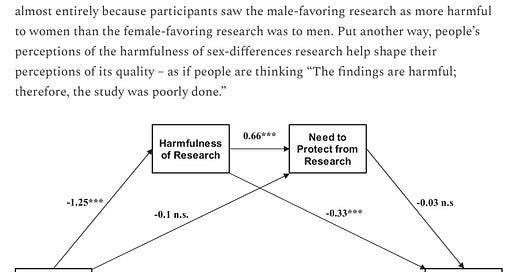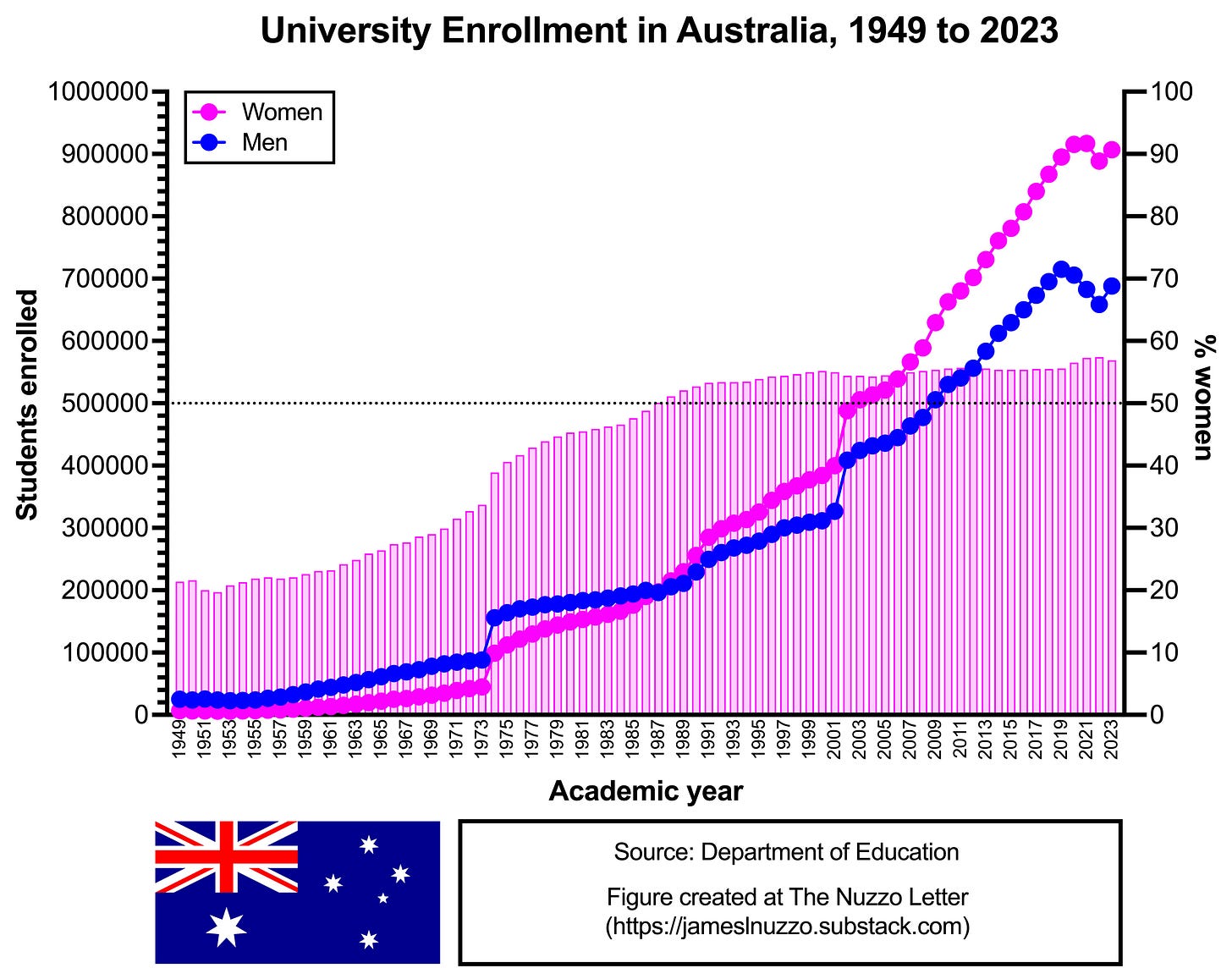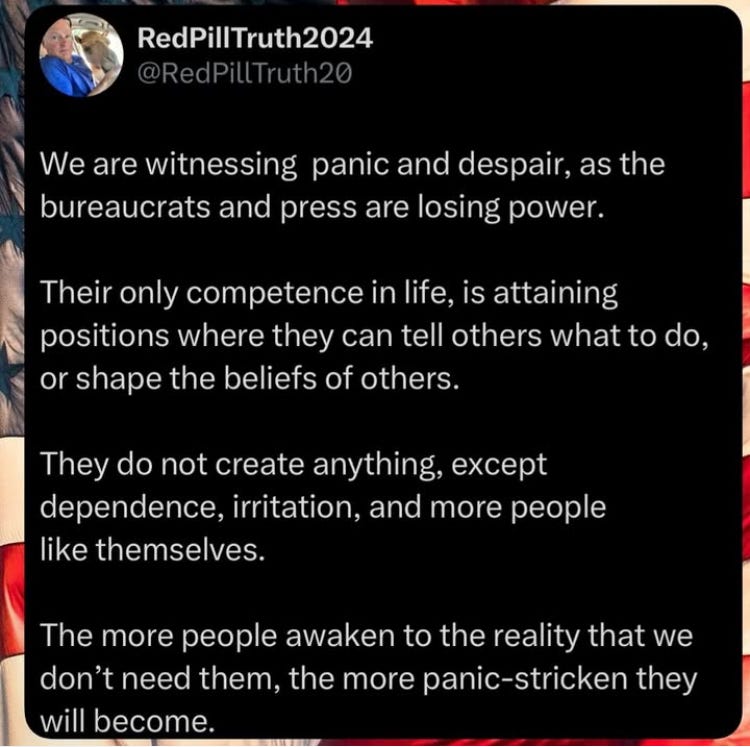We have been swimming in the water of female empowerment rhetoric for so long that it’s mostly invisible to us. When we interrogate the narratives and assumptions, I think we find a shockingly distorted and resentful cluster of ideas. These ideas are close to consensus positions, at least in the elite strata, and so it’s certain that they’re driving bad policymaking.
The emotional basis for many of them is the ‘fantasy of female power.’
The fantasy of female power is that women are just as powerful as men. They’re just as capable at political leadership, invention, military strategizing, corporate raiding, organizational dominance, and personal assertion. They are psychologically indistinguishable from men, such that old masculine cultural narratives, like the hero’s journey or the truth-telling prophet, can be equally applied to them and should be (patriarchal misapprehensions and structural barriers being the reasons they weren’t already).
According to the fantasy, any indication that women aren’t as powerful or domineering or risk-taking or ambitious as men in traditionally masculine areas of activity is simple misogyny. This fantasy applies to women as a group, but it is also applied to women as individuals. This power fantasy applies to individual female candidates for leadership positions, for female applicants for many high-stakes jobs, and for individual female characters in our fictional works. It is, in a very real sense, the guiding orthodoxy of our civilization, more potent or pervasive than multiculturalism or the poisonous doctrine of ‘anti-racism.’ That is a predictable outcome. It has been adopted and transmitted by and through nearly every major cultural institution (which are all now heavily female): K-12 education, colleges, film studios, media companies, corporate training, and government agencies.
But what if it is a fantasy?
(I’ve been reading a lot of material about feminism, feminine socialization and psychology, dating, consumer culture, mental health & therapy culture, and bureaucratization by writers like , , , , , , , , and .
My concerns are several: (1) the ways the feminine psychology combined with social media and unprecedented financial and social power are creating a new mindset (2) the ways those changes, plus misplaced empathy and a desire for risk avoidance and status are contributing to the bureaucratization of our economy and the growth of safetyism, and (3) the ways that these new values and impulses are affecting family structure and marriage and birthrates in the West, and globally.
This will probably be the last piece about feminism and feminine psychology for a bit, as I work on exploring the topic of bureaucratic expansions and how it impacts science and research and social services and the private sector; the rot within academia; the misinformation suppression complex; and immigration debates in the United States and Great Britain. I’m also working on fiction, and a case study on South Africa (‘A Fatal Dose of Equity’) and a long review of the Michel Houellebecq novel Submission, about a French academic living an empty Parisian life, as French society lurches socially and politically toward Islamicization.
If you haven’t read my work before, I attempt to write as if I was having an exchange with someone who disagrees with me. I try to be very specific and to acknowledge likely objections.
There are many things that women are good at (in general), and men are not as good at (in general). Women are better and more attentive caretakers. They’re better at nurturing children and attending to the young. They’re more emotionally responsive and more agreeable. They’re better at sensing emotional nuance.
Unfortunately, even those undeniably good things are now unfashionable to state. They conflict with the fantasy of female power. Many modern women in the West prefer to think of themselves as equivalent to men in every major area of social behavior. This supposition started as a political tool, but has since diffused through the culture and through education and come to dominate official positions and corporate trainings, and so it has formed a set of assumptions which can be very risky to question. It is far more popular than the extreme political orthodoxies of fourth-wave feminism. It is the mainstream, among elites. I don’t think it’s an exaggeration to say that most young women believe this picture (or claim to).
Do group traits really matter, in life? You are who are and you’re good at what you’re good at. Noting that men are usually larger, or that women tend to cluster around the midline in intelligence, are irrelevant to your size or intelligence. These kinds of generalizations (which are just mathematical abstractions) only matter for a few reasons:
Policymaking
Social science (understanding group attributes and dynamics can indicate certain aspects of reality)
Stereotyping
The fantasy of female power relates to the third reason, and it affects the first (policymaking) in a million different ways. The culture has formed a comforting picture of what women are and how they behave, because it’s a pleasant notion for many women, and because our society (that is, most modern men and women) is often disposed to tell women what they want to hear. Data seems to indicate that social science conclusions which advantage women (or disadvantage men) gain a better reception among women… but also among men. Everyone likes to imagine that women are capable and assertive and powerful, and these tendencies-combined with the widespread pervasion of radical egalitarianism and the blank slate fallacy in academia-have conspired to erect a social narrative.
The narrative is that women are just as capable as men (as a group) when it comes to leadership, business, invention, team building, assertion, and risk-taking. That last item might seem especially dubious to anyone who’s perused the social science data but it’s actually essential to the other ones. Taking risks is incredibly important at times in business and innovation and conquest and exploration. Assertion also might seem doubtful (along with leadership. After all, women are much more agreeable, on average.
Studies show that boys are (on average) discriminated against on the basis of sex, in grades earned. Studies show that both men AND women react better to research whose results favor women, and react better to research whose results disfavor men.
I’m extremely amenable to new data and interpretations… but the people who maintain and defend the fantasy are rarely interested in discussion or debate. The fantasy is emotionally pleasant to consider and it entails massive personal benefits for many, many educated women (and is insufficiently objectionable to educated men, so it’s allowed to stand, in a gesture of gentle permission). Here is what I suspect is the actual reality:
Men are uniquely given to high-risk activities. They’re more impulsive, more violent, more concerned with ideas and machines and systems of logic and belief. Prophets, warriors, beggars, and original scientists have always been heavily skewed towards male participants, and they always will. As evolutionarily disposable units, biology and culture understands that men can be sacrificed in order to advance society, when one outlier or iconoclast pays off big time. That’s also why men tend to be over-represented among extremely high IQ (and extremely low IQ) cohorts. Men are a Darwinian gamble: most males won’t procreate (that is the normal state of things among humans and many other mammalian species) and large numbers will drop off into war and homelessness and addiction and suicide… but the mirror image of those failures are the men who use their assertiveness and appetite for risk (and their brilliance and charisma) to build amazing structures and organizations. Those men will tend to dominate when it comes to sexual opportunities with women, and so this success measurement also becomes a sorting mechanism for biological and cultural fitness.
Women have none of those attributes (as a group). Their priorities are rarely to dominate a hierarchy or win battles or spend decades alone perfecting technologies. They are more social creatures, more attuned to the ebbs and flows of likeability and more concerned with the opinions and attitudes of others. That is why women score significantly higher on agreeability, across all cultures and times for which we have evidence. Women’s main biological imperatives are (1) to survive and (2) to find stable, high-status men to procreate with.
Our culture seems busy trying to erode (2), for the ideologues and bureaucrats probably realize, on some level, that the main obstacle to female parity is (and has always been) childbirth and the traits that come with it. The culture is getting there. People are getting married later every year and having fewer kids. The idea that finding a husband and getting married is one’s primary life goal is highly circumscribed in high schools and colleges and among young professionals. We end up with a situation in which the fantasy affects and distorts the life plan of millions of women, who believe that professional excellence and academic achievement and corporate rank-acquisition is equally available to and important for them, as women, as it is for men. They persist in this belief (dating and pairing and living according to this fantasy) during their twenties and into their thirties… until they become uneasily aware of the time constraints placed on their bodies by nature. That constraint is also very sexually unequal.
We’re still waiting for the flurry of female inventions and scientific systems and organizations. We have yet to see the dominant female-led corporations or military units, or the epic fantasy worlds with massive cultural impact authored by women. Where are the female-led religions and female-authored religious texts? Where is the mathematical or theoretical physics corpus? There are no female military units and no (ones that I know of) ascetic cults or revolutionary movements. It is possible that, in all the varieties of human behavior, it is the impulsiveness and extremity and desire for domination and obsessional solitude that helps create masculine success (and also condemns billions of men to die as soldiers and spend lives in prison and live on the street).
What we’ve seen instead is that women have infiltrated traditionally male institutions. This is a good and socially beneficial thing, of course. There’s an enormous reservoir of female energy and insight and brilliance to be harvested. However, that infiltration has come along with the ‘fantasy of female power’, such that women have changed these organizations to be more bureaucratic, more supportive, more feelings-oriented, and more feminist. In many cases there are entire multibillion dollar entities that selectively hire, train, educate, and promote women. This is literally the case across the entire upper echelon of our society, and the wealth transfers (and distortions of natural mating dynamics and the sexual marketplace) have been enormous. Anyone who questions or criticizes these changes is met with social aggression and exclusion and, in fact, most men aren’t inclined to. Men might have our doubts about the female power fantasy but we like women and we don’t want to upset them (or ruin our chances). So the fantasy survives, and it spreads.
Eventually every cultural narrative runs up against its own limitations and the strictures of reality. Men (as a group) might be uniquely capable when it comes to building companies and writing heroic fiction and leading armies and inventing technologies. If we made the reversal or suppression of that possible reality a defining cultural project (for no other reason than to promote feminist priorities and bolster the self-image of ambitious women) we would then be doing enormous harm to our society, distorting the natural selection mechanisms for skill and recognition, and systemically minimizing the status and achievement of many men, who need such things far more than women (in order to find mates and to gain meaning in life).
If this power fantasy also accorded with another great cultural/social trend (that of the bureaucratization of our society) it could then become even more potent, and malignant. If women are better suited to rising through bureaucracies than founding their own start-ups, we would expect to see women gravitating towards college degrees and large professional organizations, which is exactly what we do see. Women are more comfortable with the bureaucratic model, for they’ve grown dramatically more progressive (which is the party ideology of bureaucratization), and they regard the bureaucracy as a stand-in for the functions that used to be fulfilled by husbands: emotional support, financial assistance, childcare, housing, values, and purpose. The bureaucracy is a safer option, and one that rewards consistency and status games far more. Because the bureaucracy is sucking up more and more wealth and power, that power is disproportionately flowing to women, which wreaks downstream havoc in marriage markets and child birthrates.
Earnings gains between men/women, Theranos, the Star Wars franchise, Amazon Studios, the German Green Party, the Pete Hegseth congressional confirmation hearings, ESG scores, the disparity of male/female college graduates, dating app metrics, DEI policies, scholarships, the decline of Hollywood, the feminization (and decline) of publishing…
In each of these examples I see the female power fantasy distorting the social equilibrium. I see professional women collaborating with progressive men in order to construct a radically artificial cultural narrative of feminine power, and attacking those who express doubts, or who propose a different narrative.
We’ve abandoned the biologically rooted intuitions which have served our species well for 99.99% of our time as homo sapiens, and any reference to that older wisdom is now strictly forbidden, on pain of termination or reputation destruction. Does that seem like a natural state of affairs to you?
Christina Hoff Sommers
Thanks for reading.
















Not only do women lack the physical strength of men, and have IQs clustering around the middle, but even smart women don't think the same way smart men do - especially in terms of strategy. Among the world's chess grandmasters, only 5% are women. Among the top 500 e-sports players, year after year, zero are women. Sure there are women who buy into feminist claims and goals, and many of them gain enough power, status or notoriety to do some damage, but I don't think women have the political talents that would be necessary to successfully organize and operate in the political sphere. I think there are, and always have been, powerful men driving this divisive astroturf adventure.
If feminism were really women organizing for what women want (as opposed to feminist, male and female, organizing for goals a lot of women do not share), women wouldn't have been given the vote in 1920.
The female fantasy is one among the many dyscivilisational forces at play across the West at the moment. Climate change, mass immigration from the third world, transgenderism and lots of other such nonsense. I suspect that they're all a result of the female fantasy in some way.
These themes are largely irrational and counter to reality. Reality, of course, doesn't go away just because you don't believe in it, so how all these things end is going to be very interesting, in the "may you live in interesting times" Chinese curse sense of the word.
For instance, the UK government policy enshrined in law is driving towards net zero carbon power supply by 2050. But this is idiocy and sinply wont happen because the technology to make it happen doesn't exist. Civilisation will collapse before this happens. So will they blindly drive themselves back to medieval times, or will the people at some point revolt and say "enough is enough, you fucking idiots".